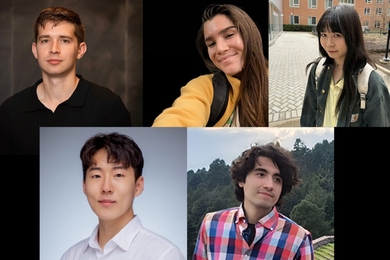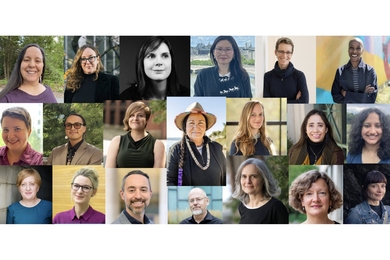Twelve journalists from the United States, Brazil, Germany, Japan, Kenya and China have been selected to spend the 2006-07 academic year on campus as the 24th class of Knight Science Journalism Fellows.
The incoming fellows, who will be taking classes, attending seminars, visiting labs and conducting interviews at MIT, are part of the Program in Science, Technology and Society. Here is the new group of journalists:
Clark Boyd is the technology correspondent for The World, a radio show co-produced by the BBC and WGBH in Boston. His four-part series on global stem cell research won an Alfred I. duPont-Columbia University Award for Broadcast Journalism in 2006. Boyd has been hosting and producing "The World's Technology Podcast" since early 2005.
Herton Escobar is a science and environment reporter for O Estado de S. Paolo newspaper in Brazil. His recent work has covered embryonic stem cells, genomic sequencing and environmental conservation in the Amazon region.
Richard Friebe is writer and editor for the Frankfurter Allgemeine Sonntagszeitung in Germany. He is also a science photographer whose work has appeared in the Financial Times and the German edition of Technology Review.
Lila Guterman is a senior reporter for The Chronicle of Higher Education. One of her recent stories brought national attention to a nearly ignored study that estimated the number of Iraqi deaths since the American military invasion.
Elizabeth Howton is the science and health editor of the San Jose Mercury News. Her team has reported on conflict of interest in drug research, human errors in hospital deaths and the ethical questions of genetic testing.
Jeanne Lenzer was a physician assistant for years before she became a freelance medical writer. Her work, which focuses on the control of information and decision making in medicine, has appeared in the British Medical Journal, Slate and Consumer Reports on Health.
Lu Yi is a senior editor and reporter for Sanlian Life Weekly, the largest news weekly in China. She has written features on panda preserves, avian flu, fossil excavation and organ transplants. She often contributes to the magazine's "Good News & Bad News" science column.
Wycliffe Muga writes about environmental conservation for the Daily Nation newspaper in Kenya. Currently a leading political analyst and opinion writer, he plans to reorient his career toward science journalism.
Stephanie Nano is the national desk supervisor and a reporter for the Associated Press. In the mid-1990s, while on a Knight International Press Fellowship, she trained young journalists in Prague. She has also taught journalists in Bosnia, Croatia and Mongolia.
Sora Song is a science reporter for Time magazine. Her recent work includes stories about sleep deprivation, pro-anorexia web sites and the soaring rate of Caesarean sections.
Tetsuro Yamada is a science writer for The Yomiuri Shimbun in Japan, the newspaper with the world's highest circulation: more than 10 million copies daily. Recently, he's written about quantum computing, nanotechnology and science policy.
Zheng Yu is the desk editor for science and technology at Xinhua News Agency, China's most influential news organization. He also writes science columns for English-language publications, such as China Daily. His book, "A Paradoxical American Superpower: Bound to Fight Us?" will be published later this year.
Howton and Lenzer will be the first two fellows in the new medical science concentration within the Knight Fellowships.
The new class was chosen by a committee comprising Carey Goldberg, health/science reporter for The Boston Globe and a former fellow; David Mindell, professor in the Program in Science, Technology and Society at MIT; Martha Henry, acting director of the Knight Fellowships; and Boyce Rensberger, director of the Knight Fellowships.
A version of this article appeared in MIT Tech Talk on May 10, 2006 (download PDF).





